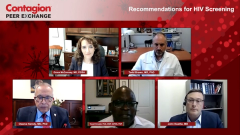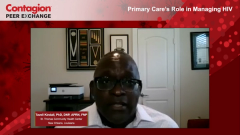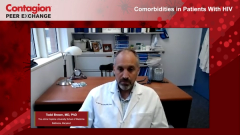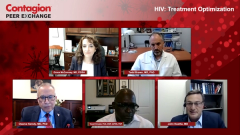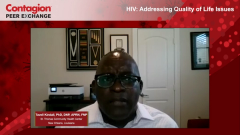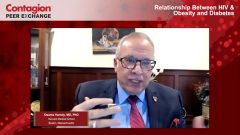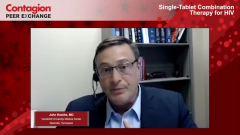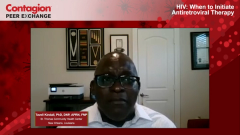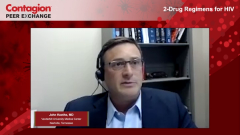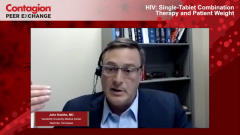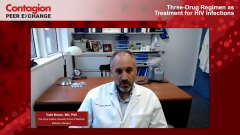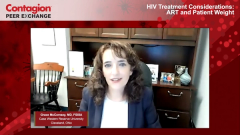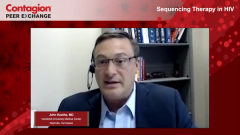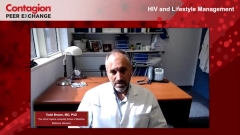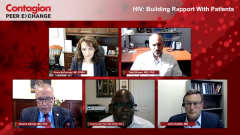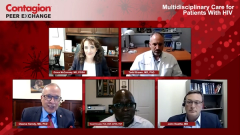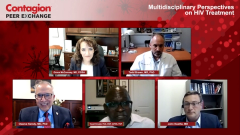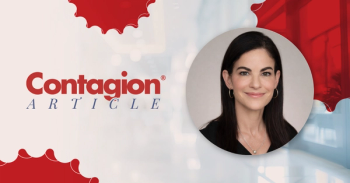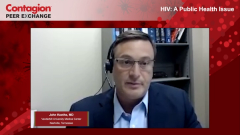
HIV: Building Rapport With Patients
The importance of establishing strong relationships with patients with HIV and expert advice on building rapport.
Episodes in this series

Grace McComsey, MD, FIDSA: Tavell, how are you supporting your patients? Obviously having HIV [human immunodeficiency virus] as a patient is becoming more complicated. How can you support these people? Some of our patients come to us and see the clinic as a big supporter in their life. They may not have family or friends supporting them. How are you supporting your patients in the clinic?
Tavell Kindall, PhD, DNP, APRN, FNP: When we meet them initially, it’s to establish that rapport with them and let them know we have a committed team of individuals who are here to help whatever it is that they’re dealing with. Because we know that whatever barriers that are there, be it housing, transportation or lack thereof, lack of finances, lack of food, all those things can significantly impact someone’s ability to become undetectable and in viral suppression.
Our support team wraps a lot of resources around people when they initially come to see us. There’s an initial assessment that’s done. You try to uncover some things that may be there. Sometimes patients are just shocked that they’ve received the diagnosis, so we may not get all the information initially, and that’s OK. As they continue to come back to us, we can break it down so it won’t be overwhelming and then try and get those individuals’ needs addressed. Over time, we need to build that rapport and that relationship, and I’m all about relationships. My patients can text me whenever they need something. Some just stop by to say hello, and that’s when you’ve gotten to a point where you have a good relationship and you’ve broken down those stigmatizing things that patients are experiencing.
When they come by just to say hello and see how you’re doing, you’ve helped them to self-actualize as someone who is going to do well. Even though they have an HIV infection, they’re going to live a healthy and full life. We take it individual-by-individual. We have case managers, linkage to care coordinators, and HIV prevention coordinators. That role is interesting because not only are they educating individuals and making sure they know about PrEP [pre-exposure prophylaxis] and access to PrEP, but they’re also helping patients understand that when they are undetectable, doing all the right things, and taking their medications like they’re supposed to, they’re not going to be transmitting HIV to others. Quality of life is a true issue. Oftentimes patients will ask me, “Can I have children?” “I’m worried that I’m going to give HIV to my fiancée, or my female partner, or my wife.” Or there’s a woman living with HIV who is worried about giving HIV to her baby. We have to strategically talk to patients, making sure that we give clear, correct messages, and make sure they understand that we’re here for them along the journey as a cohesive team and as a complete team to give them everything that they need to make sure they are successful.
Grace McComsey, MD, FIDSA: Do you use peer support groups?
Tavell Kindall, PhD, DNP, APRN, FNP: Yes, we do, and some individuals don’t want to participate in the larger groups, so we have individual support. I have several women who are newly diagnosed and struggling, and we’ve paired them with other women who have lived experience with HIV, and they are working closely with them. We see a lot of improvement with them. Otherwise, for individuals who want to participate in the larger groups, they can. Some individuals, for instance, a heterosexual man who is not comfortable being in an all-male group with men who have sex with other men, you carve that out to where you could have that particular support group. We’ll find resources in the community. Fortunately, being in New Orleans, [Louisiana], there are a variety of service organizations that can be helpful. I’m a big proponent of customer service. People need to receive good care and they deserve good care. I make sure that my team recognizes that we are dealing with a population that historically have likely had bad customer service or have not been treated well or fairly. We have to uncover and deal with all of that, and make sure that they understand that we’re on their side, that they can trust us, and that we’re here to support whatever they need.
Grace McComsey, MD, FIDSA: John, do you have anything different at Vanderbilt [University Medical Center]? Any comments on that?
John Koethe, MD: I would second what Tavell says, particularly regarding the importance of customer service within a community clinic. The patient experience starts at the door. One thing we pride ourselves on is how long many of the clinic staff members have been in our HIV treatment clinic and the rapport that patients have at each stage of the process.
The only other thing I would add is we’re understanding that HIV is something that exists both within a larger health context and within a larger health system context. There’s a need to navigate things like insurance. There’s a need to navigate access. There’s a need to be able to call the clinic and say, “I don’t have transportation today,” or “My kid is sick, can I reschedule?” And not pushing people out 6 months to the next visit, but saying, “That’s fine, we’ll get you in next week." One of the things we have is an entire office devoted to navigating the Ryan White [HIV/AIDS] Program and commercial insurance. We also have in-house pharmacists, in-house mental health, tobacco cessation, nutrition, and all these things. As providers, we’re managing more and more cardiovascular, metabolic, and other comorbidities of aging. We know when to refer people out, but we also try to identify people to refer patients to folks that seem to be HIV-literate in our other services. At least they are going to see a specialist who may have had some interaction with our providers and understands that these individuals have received all their care frequently within our HIV clinic, and are now being asked to leave the outpatient center, perhaps, and travel to the main campus where they’re going to be in a different environment. Just to be aware of that.
Tavell Kindall, PhD, DNP, APRN, FNP: That’s a huge deal. When I first came to where I’m currently practicing, I tried my best to make relationships external to where I’m currently working. I’m fortunate to have a collective of colleagues that have a variety of other specialties—internal medicine, med peds [medicine pediatrics], family medicine, all of that—within the confines of the organization. But as you said, if you must refer them out, you want to send them where you know that they’re going to be careful and nobody’s going to treat them badly. I made it a point to get out in the community and meet these other providers to make sure they understand, “Look, here’s who I’m sending you. I want to make sure that we’re both on the same page and agree that this patient deserves to be treated with respect, dignity, and those kinds of things. They can benefit from your expertise, but you need to treat them right.” That’s important.
Grace McComsey, MD, FIDSA: Trust comes with time. I’ve been taking care of some patients for over 15 years, and it’s amazing. They go to a different state. They keep coming every 6 months—travel and everything—just to see me because they don’t want to deal with a new doctor. That’s part of why we attract ID [infectious diseases] fellows, because they go to our clinic and see how our patients deal with us. A lot of them say, “Wow, I love that clinic.”
Thank you for watching this Contagion® Peer Exchange. If you enjoyed the content, please subscribe to the e-newsletter so you can receive upcoming Peer Exchange segments and other great content. Thank you for listening.
Newsletter
Stay ahead of emerging infectious disease threats with expert insights and breaking research. Subscribe now to get updates delivered straight to your inbox.

